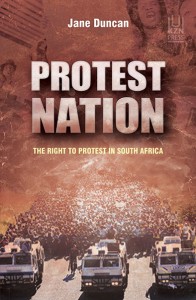Repression Against the Student Movement in South Africa
22nd Nov 2016 | By Jane Duncan | Category: Anti-Repression Initiative, BooksStudents across South Africa are engaged in an ongoing struggle for free education. The #feesmustfall campaign, which began in October 2015, has turned violent. Buildings and vehicles at several universities have been burned since a new wave of protests kicked off in the middle of September 2016. University management has responded by securitizing campuses, seeking wide-ranging interdicts against students and deploying ill-trained private security guards to suppress the protests.
State repression creates solidarity among movement participants, who justify the need for violence as a form of self-defence, or, as Donatella Della Porta puts it, violence emerges from violence. The sad reality is that the authorities often ignore peaceful, non-disruptive protests. What students have deduced from this is that unless the “normal” functioning of an unequal educational system is disrupted, then it is unlikely to change.
Sociologists have argued that political violence by protesters is rarely ever adopted overnight or consciously. Rather, in the early stages of the protest cycle, such violence is generally unplanned, small in scale and limited in scope. It often occurs as a spontaneous reaction to an escalation of force by the police or a more general closure of democratic space. Many protesters are frightened off by the escalating violence, but small groups begin to specialise in tactics that do not rely on mass support – such as more organised acts of violence. These tactical decisions shift the struggle onto a terrain that is dominated overwhelmingly by the state and its repressive apparatus.
It is the easier route for universities to say and do “security” in response to growing campus unrest. But it is also the more simplistic road. There is enough scholarship to show that this road leads nowhere. University actors must do more to break with this self-fulfilling prophecy.
 For a detailed and insightful account of the myriad ways in which the policing of protest violates the rights of ordinary South Africans, see the new book by Jane Duncan (University of Johannesburg), Protest Nation: the Right to Protest in South Africa, published in September 2016 by UKZN Press.
For a detailed and insightful account of the myriad ways in which the policing of protest violates the rights of ordinary South Africans, see the new book by Jane Duncan (University of Johannesburg), Protest Nation: the Right to Protest in South Africa, published in September 2016 by UKZN Press.

